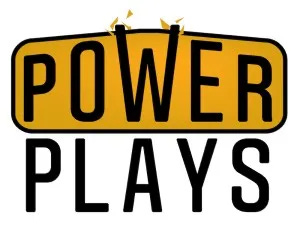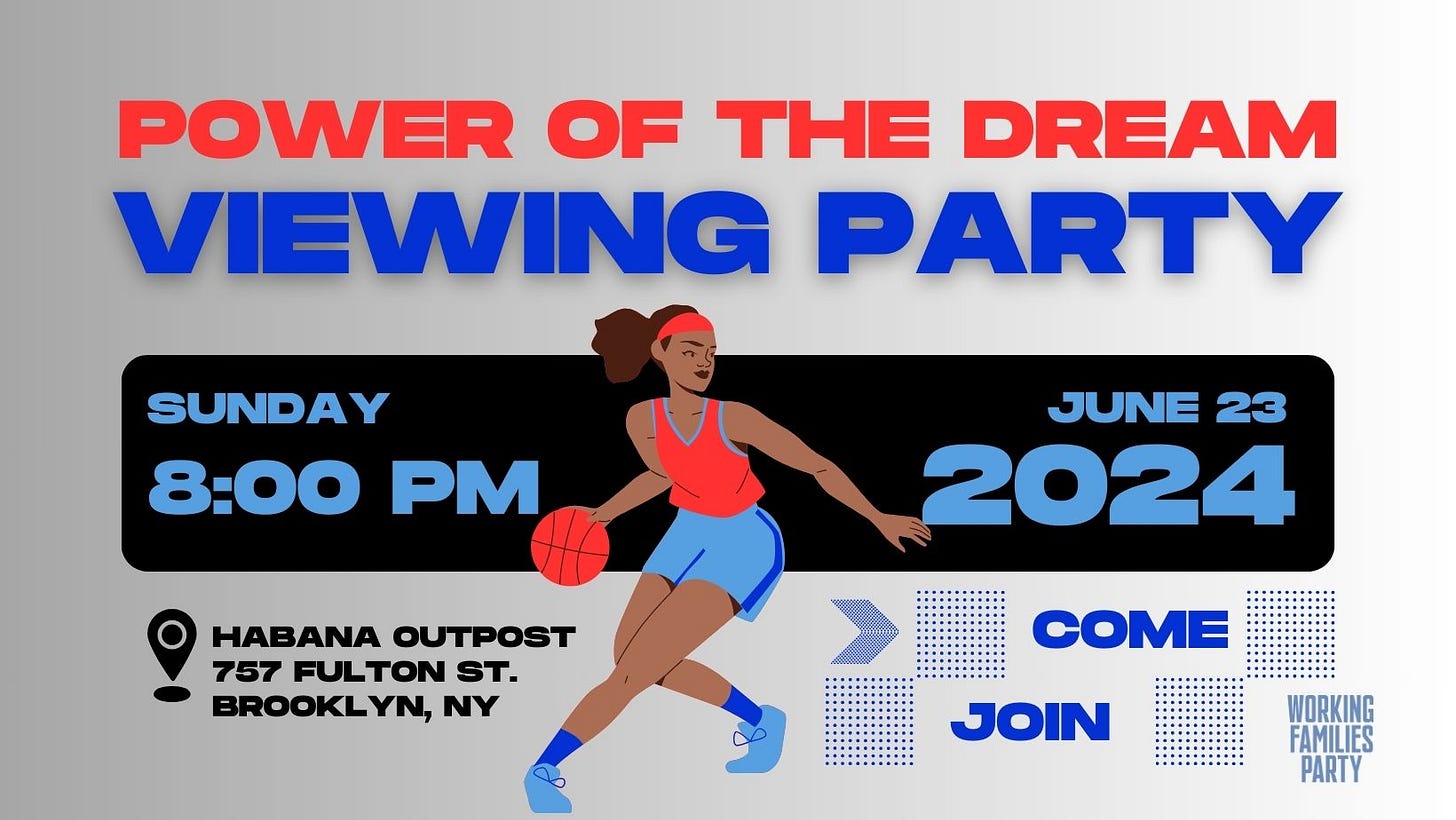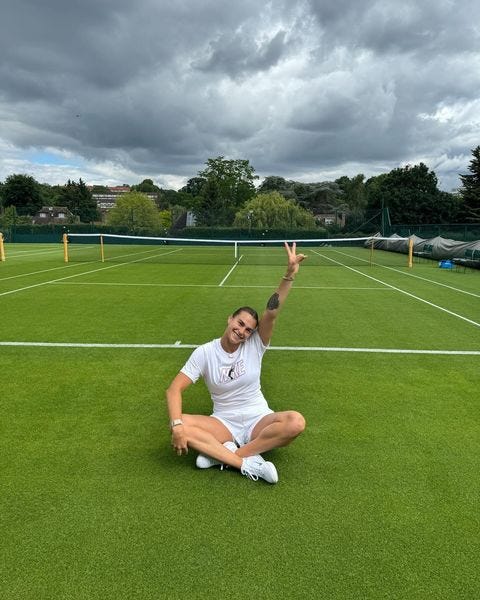Embracing the selfish era of women's sports
It is okay to chase the bag.
Happy Juneteenth, friends!
Before we get started with this week’s free newsletter, I highly recommend listening to today’s episode of the Athletic women’s soccer podcast “Full Time,” in which co-host Tamerra Griffin explores Blackness in the NWSL through interviews with Washington Spirit rookie Croix Bethune and Spirit VP of Community Development, RaShauna Hamilton.
Also, Chicago Sky forward Brianna Turner (who is a must-follow on Twitter) shared an educational video today for those who don’t know much about the significance of Juneteenth, and I thought I’d share that in Power Plays, too. As Turner wrote, “Black history is American History. It should be taught and acknowledged, instead of banned or restricted.”
One more thing before:
This edition of Power Plays is sponsored by the Working Family Party’s “Basketball House,” which throws events that seek to build political power for the multiracial working class by creating community in our fandoms and making collective civic engagement convenient, accessible, and fun.
This Sunday (6/23) in Brooklyn at 8:00p.m. ET, they are hosting a screening of “Power of the Dream,” the documentary about how the Atlanta Dream and WNBA helped swing the 2020 election. Click the link for more info and to RSVP!
Being greedy isn’t always a bad thing
This week, as The Discourse has continued in women’s basketball, a couple of other big women’s sports stories have been brewing under the surface.
First, Stanford softball pitcher NiJaree Canady announced that she is entering the transfer portal. Then, in tennis, we saw two of the sport’s biggest stars — Aryna Sabalenka and Ons Jabeur — announce that they would be missing the Olympics in order to better prepare for hard-court season.
I’m not going to lie: When all three announcements came out, I first felt shock, and then a tinge of disappointment. I was selfishly excited to have Canady pitching in the ACC next season, and the Olympic tennis tournament won’t be the same without Sabalenka and Jabeur, two of my favorite players to watch. But then, after thinking about it for a minute, I felt a rush of pride: These women are being selfish. And that’s a good thing.
Let’s start with Canady, the 2024 USA Softball Player of the year, Softball America Pitcher of the Year, and First-Team All American. Her first two years in college were spent pitching at Stanford University, where she took the Cardinal to back-to-back Women’s College World Series appearances. (Prior to her arrival, Stanford had only been to the WCWS twice, in 2001 and 2004.)
On social media, there were many people stunned to see her in the transfer portal (myself included); it is not often you see the player considered to be the best in college softball leave their school after two successful seasons, and it’s certainly not super common for Stanford athletes to enter the portal. When Canady committed to Stanford in 2021, picking it over many high-profile rivals, she said she was picking the school for academics alongside athletics.
“College isn’t just a four-year decision," Canady told WIBW-TV on October 12, 2021, per the Oklahoman. "It’s a 40-year decision. So, I feel like Stanford, it’s going to prepare me for life. I’m excited for that.”
But let’s be honest: Times have changed in college athletics since 2021. You might even call these times, well, unprecedented. At long last, NCAA athletes are able to profit from their name, image, and likeness (NIL) while they are still in school. But, especially in these early days, not all NIL programs are created equally.
I want to be clear that we do not know exactly why Canady is transferring from Stanford. She might be interested in going to a more prestigious program like Texas or Oklahoma, where she could push past just making the WCWS and truly compete for national championships. She might not want to play in the ACC, which is the conference Stanford is now a part of, and doesn’t have a lot of depth when it comes to softball competition. She might just not have liked Stanford, or she might want to be closer to her home state in Kansas. In reality, it’s probably a mix of a few things.
But if money is a driving force behind her decision, if it all comes down to one NIL program being able to provide her with a bigger paycheck than another, then I am honestly thrilled she’s going for it.
Yes, there are more opportunities than ever for softball players after graduation, thanks in large part to Athletes Unlimited, but the professional softball world still has a long ways to go before it can offer star players life-changing amounts of money and professional security. It would be, frankly, foolish for Canady to not do everything she can to maximize her opportunities for money and success while she’s still has two years of college eligibility remaining. She can’t get these years back.
Just like in women’s basketball, NIL and the popularity of the transfer portal changes things for softball, and it’s normal for change to make us all a bit uncomfortable. But uncomfortable doesn’t have to mean bad. We can’t fight for women athletes to have more opportunities to make money and then get mad at them for chasing after them; that’s not fair.
Now let’s talk about tennis. This week, No. 3 Sabalenka and No. 10 Jabeur both announced that they were going to be missing this year’s Paris Olympics, which will be played on the clay at Roland Garros after Wimbledon (which is on grass) and before the U.S. Open (which is on hard courts). They’re not alone; 2021 U.S. Open champion Emma Radacanu already announced she is not accepting a wild card from British tennis to play the event, and Elise Mertens is skipping it as well. It would not be shocking if more top players followed suit.
Both cited health concerns, the packed summer tennis schedule, and the difficulty of so many surface changes in such a short period of time as reasons for opting out. (Though it is worth noting, in Sabalenka’s case, that she is Belarussian, and athletes from Belarus and Russia will only be allowed to compete at the Olympics this year as neutrals, following Russia’s invasion of Ukraine in 2022.)
Now, look. I am an Olympics fiend. I’ve watched every possible second of the Olympics I could for about 30 years now. I’m obsessed, and I want everyone to think they’re as magical as I do, because it hurts my feelings when they don’t. But that’s a me problem.
Sabalenka and Jabeur have every right to prioritize whatever the hell they want to prioritize in their careers. Both have been to the Olympics before — Sabalenka in 2021, and Jabeur in 2021, 2016, and 2012. Neither has made it past the second round. Would this year be a great chance for that to change? Yes, absolutely. But both also have an opportunity to do well at the two WTA 1000 events in Cincinnati and Canada in August and at the final major of the year, the U.S. Open. Those events also provide ranking points (which the Olympics does not) and an opportunity to win millions of dollars. Athletes only have so many years in their prime, it’s only right that they get a say in how to maximize it.
Part of the reason why the Olympics has meant so much to women’s sports over the years is because it’s the only stage they get real media coverage and resources. It’s a good thing that women’s tennis players have other options.
Now, could Sabalenka and Jabeur both have terrible tournaments in Cincinnati, Canada, and Flushing Meadows, despite taking time off during the Olympics? Could they get injured on hard court even though they didn’t add in an extra tournament on clay? Of course! It’s sports. That’s a possibility. Could Canady end up regretting her decision to transfer? Absolutely. Sometimes you don’t make the best choices, and sometimes there’s no way to know if the choices are right or not until after you make them. That’s a part of life.
But for so long, women in sports have had to take whatever crumbs are available. They’ve been limited by circumstance. Every time that’s not the case is worth celebrating.







